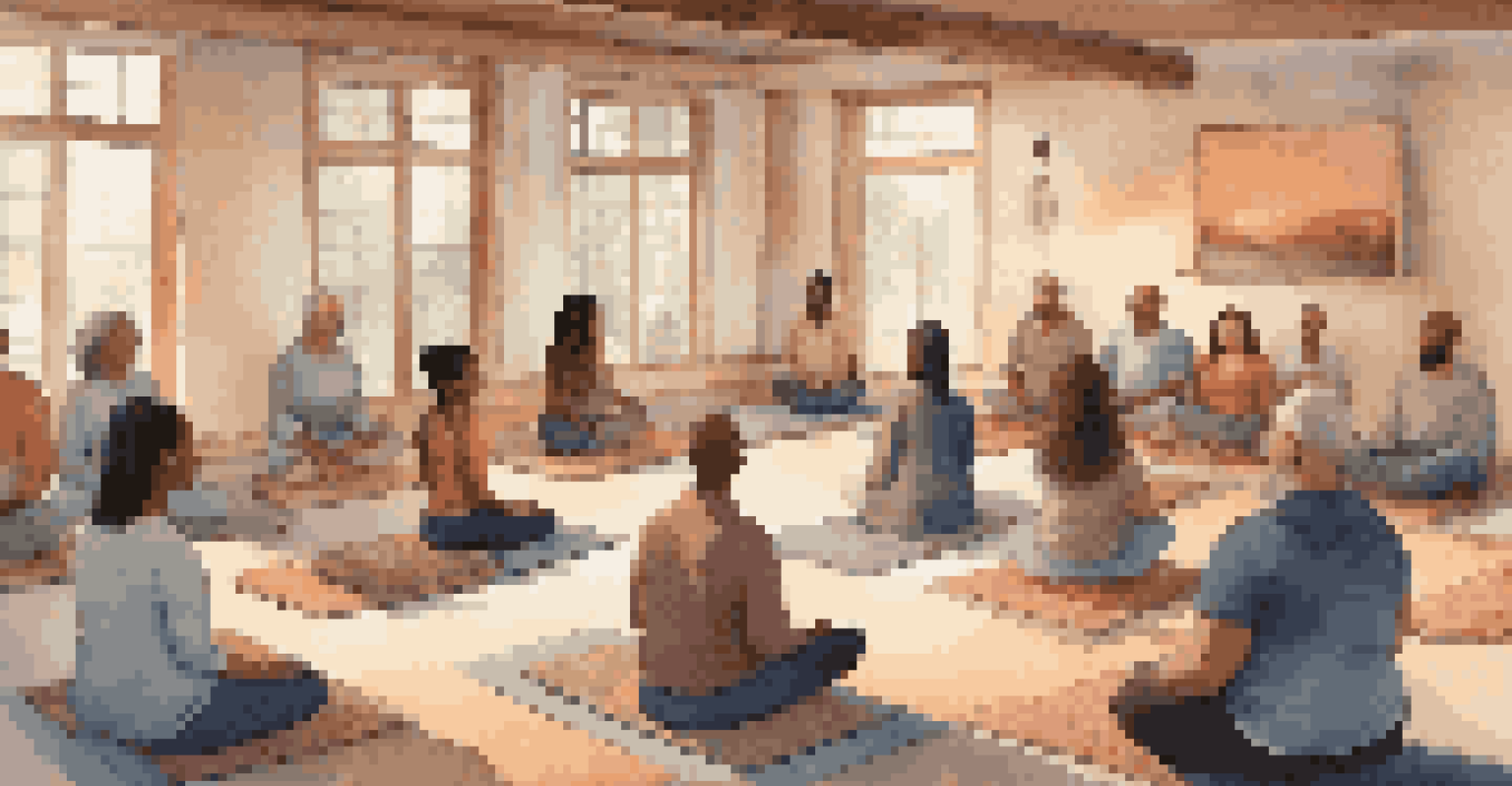Healthy Aging: Using Meditation for Stress Reduction

Understanding Healthy Aging and Its Importance
Healthy aging goes beyond just living longer; it's about maintaining quality of life. As we age, our bodies and minds go through various changes that can affect our well-being. Embracing healthy aging means adopting habits that enhance our physical, mental, and emotional health.
The mind is everything. What you think you become.
One of the key components of healthy aging is managing stress, which can take a toll on both the body and mind. Chronic stress is linked to numerous health issues, including heart disease and cognitive decline. Therefore, finding effective ways to cope with stress is essential for aging gracefully.
Meditation emerges as a powerful tool in this regard, offering a pathway to tranquility amidst life's challenges. By incorporating meditation into our daily routine, we can foster resilience against stress and enhance our overall quality of life as we age.
What Is Meditation and How Does It Work?
Meditation is a practice that involves focusing the mind to achieve a state of calm and clarity. It can take various forms, including mindfulness, guided imagery, and loving-kindness meditation. Each type offers unique benefits, but they all share the common goal of promoting relaxation and mental well-being.

When we meditate, we create a space for ourselves to step back from the chaos of daily life. This intentional pause allows our minds to unwind, which can lead to a decrease in stress hormones like cortisol. Over time, regular meditation can help reshape our brain's responses to stress, making it easier to remain calm in tough situations.
Healthy Aging Enhances Quality of Life
Embracing healthy aging involves adopting habits that improve physical, mental, and emotional well-being.
Additionally, meditation encourages self-awareness and emotional regulation. By tuning into our thoughts and feelings during meditation, we can better understand our stress triggers and develop healthier coping mechanisms. This increased awareness is particularly beneficial as we navigate the complexities of aging.
The Science Behind Meditation and Stress Reduction
Research has shown that meditation can significantly reduce stress and improve mental health. Studies indicate that individuals who meditate regularly report lower levels of anxiety and depression. This is largely due to meditation's ability to activate the body's relaxation response, countering the effects of stress.
Meditation is the discovery that the point of life is always right where you are.
Neuroscientific studies have also revealed that meditation can lead to structural changes in the brain. For instance, areas associated with emotional regulation, such as the prefrontal cortex, may become more active, while the amygdala—responsible for stress responses—may shrink. These changes can enhance our ability to cope with stress as we age.
Furthermore, meditation has been linked to improved immune function and cardiovascular health. By lowering blood pressure and reducing inflammation, meditation not only helps us manage stress but also promotes physical health, making it a crucial practice for healthy aging.
Getting Started with Meditation: Simple Techniques
If you're new to meditation, starting can feel daunting, but it doesn't have to be. Begin with just a few minutes a day, focusing on your breath or repeating a calming mantra. The key is to create a comfortable environment where you can relax without distractions.
One effective technique is mindfulness meditation, where you observe your thoughts without judgment. This practice helps cultivate awareness and acceptance, allowing you to navigate stressful situations with greater ease. Apps and online resources can also guide you through the process, making it accessible for everyone.
Meditation Reduces Stress Effectively
Regular meditation can lower stress hormones, enhance emotional regulation, and promote overall mental health.
As you become more comfortable with meditation, gradually increase the duration of your practice. Even 10 or 15 minutes a day can yield significant benefits over time. Remember, consistency is more important than perfection—it's about creating a habit that supports your well-being.
Incorporating Meditation into Your Daily Routine
To reap the full benefits of meditation, it's essential to incorporate it into your daily routine. Find a time that works best for you, whether it’s in the morning, during lunch breaks, or before bed. Creating a designated meditation space can also help signal to your mind that it's time to relax.
Consider pairing meditation with other daily activities, such as mindful walking or stretching. This not only enhances your practice but also integrates mindfulness into your overall lifestyle. Over time, you'll find that moments of meditation become a cherished part of your day.
Additionally, don't be afraid to experiment with different styles of meditation. What works for one person may not resonate with another. The goal is to find a practice that feels right for you, fostering a sense of peace and balance as you navigate the aging process.
The Role of Community in Meditation Practice
Engaging with a community can greatly enhance your meditation practice. Joining a local meditation group or participating in online forums can provide support, encouragement, and accountability. Sharing experiences with others can deepen your understanding of meditation and its effects on stress reduction.
Community meditation sessions also offer an opportunity to learn from experienced practitioners. You can discover new techniques and gain insights that may elevate your practice. Plus, meditating in a group setting can create a powerful shared energy that amplifies the benefits.
Community Supports Meditation Practice
Engaging with a meditation community provides support and shared experiences, enriching the practice and fostering connections.
As we age, building connections with others becomes increasingly important. A meditation community not only fosters a sense of belonging but also provides a platform for discussing the challenges and joys of aging. Together, you can cultivate a supportive environment for healthy aging through mindfulness.
Embracing Meditation for Lifelong Benefits
Meditation is not just a practice; it's a lifelong journey that can significantly impact your aging experience. By incorporating meditation into your daily routine, you're investing in your mental and emotional well-being. The stress-reducing benefits can lead to a more balanced and fulfilling life as you navigate the challenges of aging.
Moreover, the skills you develop through meditation—such as mindfulness, patience, and resilience—can be applied to various aspects of life. Whether you're dealing with health concerns, family dynamics, or personal goals, meditation equips you with tools to approach these situations with greater clarity and calm.

Ultimately, embracing meditation as part of your healthy aging strategy can lead to profound changes. It can enhance your overall quality of life, allowing you to age gracefully and with purpose. So, take that first step and begin your meditation journey today—you deserve it!